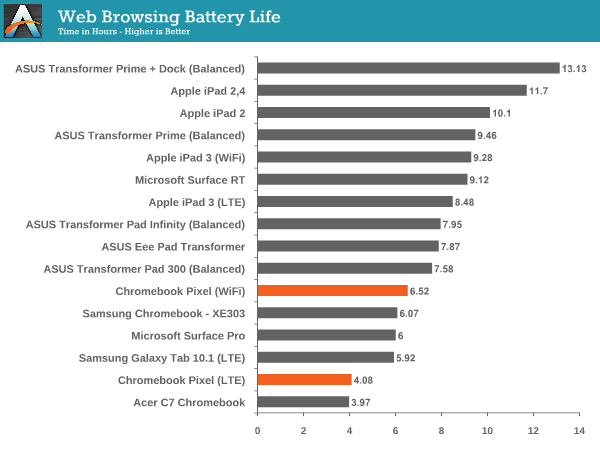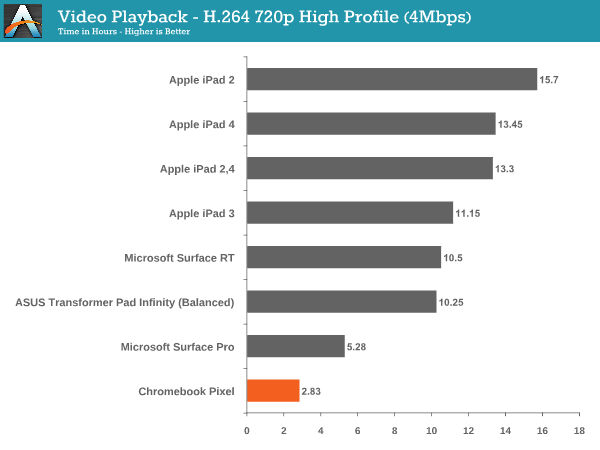The Chromebook Pixel Review
by Jason Inofuentes on May 31, 2013 8:00 AM ESTBattery Life
Like our performance tests, our battery test borrows more from our tablet reviews than it does our notebook reviews. The inability to run any native software here limits us to... well, to the browser. So, we start with our web browsing test. The idea is straightforward, we’re cycling through four websites, disabling any background services that might interrupt the process and setting the display to our customary 200 nits. This test is designed to challenge ARM cores, giving them just enough time to render a page and go back to sleep before asking for the next page. This isn’t as challenging for Ivy Bridge silicon, which is able to complete the render and rush to sleep much faster, which we know can yield better average power consumption and better battery life. The other factor that affects battery life in this scenario is that display. With over 4 million pixels to light up, the panel is going to chew through power a lot faster than something less dense. Only one way to found out how it goes, though.

The Pixel ends up eking out 6.5 hours on WiFi, besting the Surface Pro by a bit, but it’s much more a wash, the larger battery’s added capacity is exhausted by the more power hungry screen. On LTE the Pixel puts up 4.08 hours of stamina; enough for a few hours at a cafe, but not an all day untethered session.
Our video test loops a 720p video encoded with H.264 with an average bit rate of 4 Mbps with the screen once again set at our traditional 200 nits. Running this test on a Chromebook is a little different than any other platform. The video player does exist somewhat outside the browser, but the software is written in HTML5. Hardware accelerated decode of H.264 content is a staple of Chrome and HTML5, though. Right?

This is really awful, and surprising performance. The best explanation we can muster is that an issue in the video player is preventing this file from utilizing hardware decode resources. In that case, decoding and then scaling the video to match the display might tax the system enough to cause this sort of poor performance. If that's the case then an update could drastically impove this score; until then, though, the Pixel does not make for a good media companion on the road.
Ultimately, what we’re really seeing in these charts, is that the rush to sleep advantage Ivy Bridge has over ARM is not enough to overcome ARM’s power envelope. The Pixel’s silicon is a 17W part. Even the most power hungry ARM SoCs in this table clock in below 5W. That’s a deficit that’s going to be hard to overcome... for now. There’s a very real reason to suggest caution in buying anything with Ivy Bridge right now, Anand made the same case in his Surface Pro review. A Haswell alternative in the future should exhibit better battery life, with equivalent performance. There’s also the Atom refresh (Silvermont) to consider; a quad-core Baytrail part could provide plenty of performance while drawing a lot less power than the Ivy Bridge part we’re using today.
Is the Pixel going to let you sit in the park all day, working on the great American novel? No, it won’t. Heck, it might not get you through a longish movie during a flight. If untethered stamina is a prime concern, look elsewhere than really any of the Chromebooks. If you’re near an outlet most of the time, this performance just isn’t great. When you design a thin, modern notebook, you have to make compromises, and in this case, battery life was one of them.










74 Comments
View All Comments
8steve8 - Friday, May 31, 2013 - link
I like how you compare it to both laptops and tablets in performance charts, but I'm disappointed that the battery life charts didn't include other laptops.Nimer55 - Saturday, June 1, 2013 - link
I got a chromebook (non-LTE) at I/O, and have been using it instead of my Vizio 14 as my primary machine, and I've gotten the "So it's like an iPad" question a few times, and I've been absolutely clueless as to how this was like an iPad. To me, it appeared to be the opposite of a iPad; you only get websites, where as iOS is all about using an app for everything. Not the mention I get a keyboard to type on. Thank you for clearing that up.Overall, I felt the review was well done; I agree with the 4gb of ram not being enough. I feel performance degrading as I get to few dozen tabs. I really love this laptop, but I would never buy it; it's out of my price range.
The non-tapered edges to make the device appear thicker than it is, but it also makes it feel higher-quality. Having an edge that becomes really thin gives it a "toy-esk" feeling. (My Vizio 14 has it, it makes it feel less premium... Though it's non-aluminum back could be a good cost saving technique if Google were to decide to create one for under a $1000...That and a 1080p-ish resolution would be the most logical cost saving tools to me. Those and a cheaper, but next-gen CPU would be way of getting the price to around $750).
jabber - Sunday, June 2, 2013 - link
"a few dozen tabs".....Wow...what exactly are you doing that requires 24+ browser tabs open?
I have the Samsung 11" Chromebook and use it a lot but usually sits around half a dozen open max.
Selden - Saturday, June 1, 2013 - link
Excellent review, as I expect from Anandtech. I agree with you fully about memory management, which is an Achilles heel for Chrome OS. ZRAM definitely helps, but the file manager, even on the latest beta (Version 28.0.1500.20), is an utter pig. I'm on an extended trip to Alaska, taking a lot of photos, and copying, let alone viewing/editing photos quickly runs free memory down below 100 mb. Pushed hard enough, the image viewer will start behaving erratically; the only option then is to restart — fortunately, a rapid process, but it shouldn't be necessary.leexgx - Saturday, June 1, 2013 - link
for the price of the new chromebook 8gb of ram should be very easynerdstalker - Saturday, June 1, 2013 - link
For a device that promises mostly web browsing and integration with the cloud services, WiFi performance of Pixel is not stellar. It has 2x2 MIMO (2 dual band antennas) that is comparable to Macbook Air. However, WiFi performance is not as good as MBA, especially 5 GHz. rMBP models on the other hand (both 13" and 15") have top notch 3x3 MIMO (3 dual band antennas) with pretty good throughputs.internetf1fan - Saturday, June 1, 2013 - link
Few things about your review.#1) Why did you use sunspider 0.9.1 when V1 was just recently released?
#2) Since you are comparing hardware, it would be best to use the same software where possible. Chrome OS the chrome browser, so instead of using stock browser on other OS, you should have installed chrome on Mac and Surface Pro as well so that the hardware comparison would be consistend.
leexgx - Saturday, June 1, 2013 - link
all other tests was done with 0.9.1at least test stock and chrome on sunspider
ECIT - Monday, June 3, 2013 - link
I must admit that I was a bit sceptical when the Pixel was announced. Google has enough work convincing people to buy into the whole Chromebook concept even with low-cost versions, let alone at Pixel's price.On the other hand, the Pixel does look pretty cool. And I do think that Chromebooks in general have their place in the market, especially as a second home device. Most people spend a lot of their time on the Internet anyway, and there are more and more web apps out there.
For those that are considering Chromebooks but still need to access Windows applications, they can look at Ericom AccessNow, an HTML5 RDP client that enables Chromebook users to connect to Terminal Server or VDI virtual desktops, and run Windows applications or even full desktops in a browser tab.
Click here for more information:
http://www.ericom.com/RDPChromebook.asp?URL_ID=708
Please note that I work for Ericom
jeffkro - Monday, June 3, 2013 - link
Wow, way to expensive and an overkill display for the screen size. I would like to see a 14-15" 1080p chromebook in the $500-600 range, no laptops should have less than 1080p these days. Also since chrome OS is so lightweight you really only need a 1.5ghz celeron processor.